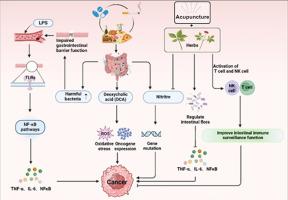通过中医药(TCM)调节肠道微生物群--改善胃肠道(GI)癌症预防和管理的效果
Pharmacological Research - Modern Chinese Medicine
Pub Date : 2024-11-02
DOI:10.1016/j.prmcm.2024.100528
引用次数: 0
摘要
导言:胃肠道癌症(如结肠直肠癌、胰腺癌和胃恶性肿瘤)的发病率越来越高,而且因预后不良和缺乏令人满意的治疗方法而臭名昭著。新的证据表明,消化道中数以万计的肠道微生物在维持健康和预防疾病方面发挥着至关重要的作用,这使其成为消化道癌症治疗中一个前景广阔的靶点。此外,传统中医药的悠久传统和智慧为补充目前的消化道癌症疗法提供了宝贵的见解,值得赞赏。根据中医原理,消化道疾病主要归因于 "气虚"、脏腑功能失调和阴阳失衡。治疗策略不仅包括中药配方,还包括非药物治疗方法。例如,葛根清连煎和艾地注射液等著名疗法在治疗消化道疾病方面有着悠久的历史。这些中药组合被视为补气药,可从根本上治疗消化道癌症。此外,灵芝和人参具有增强免疫力和提高整体活力的作用。姜黄和大黄具有抗炎、解毒和养血的功效。中医还采用针灸等非药物干预措施,这些措施可能会产生协同效应。这些方法的治疗效果及其缓解症状的能力,为与免疫疗法和化疗等常规疗法的潜在结合提供了启示。几项临床试验显示了积极的结果,突出了肠道微生物群在消化道环境中参与介导这些中草药干预措施的效果。初步确定了截至 2024 年发表的 300 篇文章,根据这些文章与中医干预措施以及肠道微生物群与消化道癌症的直接或间接关系,从中选出 180 篇文章纳入本综述。结果本综述强调了肠道微生物群的功能以及微生物菌群失调对消化道癌症发生的影响,特别关注了肠道微生物群落紊乱与癌症进展之间的关联机制。讨论该综述讨论了基于中医药的干预措施在调节微生物组和缓解消化道癌症方面的潜力,以及中医药与肠道微生物群相互作用的机制。此外,它还强调了在消化道癌症治疗中采用基于微生物组的创新方法的必要性。总之,以微生物为基础、结合中医药的更有效策略亟待开发,这也凸显了临床试验的未来方向,即探索中医药参与消化道癌症治疗的更多可能性。尽管化疗和免疫疗法等传统疗法依然重要,但中医药的结合可作为消化道治疗的补充策略。为加深对中医药与微生物组相互作用的了解,应开展高质量、安慰剂对照、随机、双盲的临床试验。本文章由计算机程序翻译,如有差异,请以英文原文为准。

Gut microbiota modulation through Traditional Chinese Medicine (TCM) - improving outcomes in Gastrointestinal (GI) cancer prevention and management
Introduction
Gastrointestinal (GI) cancers, such as colorectal cancer, pancreatic cancer and gastric malignancies, are increasing in prevalence and are notorious for poor prognosis and lack of satisfactory curative therapies. Emerging evidence indicates that the trillions of gut microbiotas in the GI tract play a crucial role in maintaining health and preventing disease, making it a promising target in GI cancer management. Additionally, the longstanding tradition and wisdom of Traditional Chinese medicine (TCM) are appreciated for offering valuable insights to complement current therapies against GI cancers. According to TCM principles, GI disorders are primarily attributed to ‘Qi-deficiency’ and disharmony among organs functions and Yin-yang imbalance. Treatment strategies not only include herbal formulations but also encompass non-pharmacological methods. For instance, well-known remedies such as Gegan Qing Lian Decoctions and Aidi injection have a long-standing history of treating GI disorders. These herbal combinations are considered Qi tonics which address the root causes of GI cancer. Furthermore, Reishi Mushroom and Ginseng are for their immune-supportive properties and ability to enhance overall vitality. Turmeric and Chinese rhubarb are noted for their anti-inflammatory, detoxifying and blood-nourishing effects. TCM also incorporates non-pharmacological interventions such as acupuncture and moxibustion, which may yield synergistic effects. The therapeutic benefits of these approaches, coupled with their symptom-relieving abilities, have provided insights for the potential integration with conventional treatments such as immunotherapy and chemotherapy. Several clinical trials have demonstrated positive outcomes, highlighting the involvement of gut microbiota in mediating the effects of these herbal interventions within the GI environment.
Methods
A comprehensive literature search was conducted using keywords including Traditional Chinese medicines (TCMs), Gastrointestinal (GI) cancers, gut microbiota, dysbiosis, GI disorders. Initially, a total of 300 articles published up to 2024 were identified, of which 180 articles were selected for inclusion in this review based on their relevance to TCM interventions and the modulation of gut microbiota in relation to GI cancer, either directly or indirectly. A variety of study designs including meta-analyses, systematic reviews, randomized controlled trials, and studies conducted on both human and rats are included.
Results
This review highlights the functions of gut microbiota and the implications of microbial dysbiosis in GI carcinogenesis, specifically focusing on the mechanisms that link disruptions in gut microbial communities to cancer progression. Additionally, it highlights the potential integration of Traditional Chinese Medicine into conventional cancer treatment and management by both pharmacological and non-pharmacological approaches.
Discussion
The review discusses the potential of TCM-based interventions to modulate the microbiome and mitigate GI cancer, along with the mechanisms through which TCM interacts with gut microbiota. Furthermore, it highlights the necessity for innovative microbiome-based approaches in GI cancer management. In conclusion, there is a critical need for more effective microbiome-based strategies that incorporate TCM, highlighting the future direction of clinical trials aimed at exploring more possibilities of involving TCM to GI cancer treatments. While conventional treatments such as chemotherapy and immunotherapy remain important, the integration of TCM may serve as complementary strategies in GI therapy. To advance the understanding of TCM-microbiome interactions, high-quality, placebo-controlled, randomized, double-blind clinical trials should be conducted.
求助全文
通过发布文献求助,成功后即可免费获取论文全文。
去求助

 求助内容:
求助内容: 应助结果提醒方式:
应助结果提醒方式:


